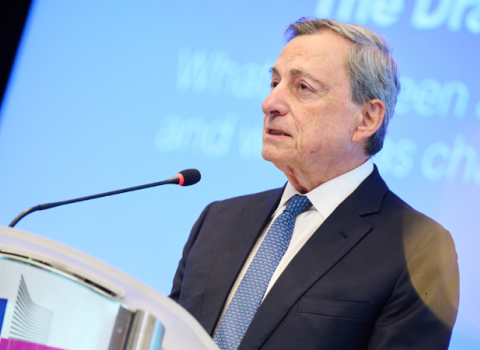Here’s an explainer on how the next seven-year EU research programme, FP10, is being crafted, from the EU institutions and stakeholders, to the budget battle and potential sticking points

As the year draws to a close and 2024 comes into view, we’re here to brief you on the preparations underway to shape Framework Programme 10 (FP10).
FP10 doesn’t start until 2028, but 2024 is going to be a big year for the next seven-year research programme, with the European Commission starting to pencil in the outline ahead of a comprehensive proposal in 2025.
Key (provisional) dates:
- January 2024 – publication of the ex-post evaluation of the 2014 - 2020 Horizon 2020 research programme and how its €80 billion budget was spent
- June 2024 – member states outline their vision in the European Research Area and Innovation Committee (ERAC) FP10 task force report
- October 2024 – Commission expert group led by former science minister of Portugal Manuel Heitor publishes its independent report on the future of European research and innovation
- Early 2025 – the interim evaluation of Horizon Europe is due to be published
- By 1 July 2025 – the official Commission proposal for FP10 is unveiled
- Autumn 2025 – member states start negotiations on the proposed framework programme
- Beginning of 2026 – member states reach a deal and negotiations with the European Parliament start
- End of 2026 – (hopefully) a deal on FP10, leaving the Commission a year to prepare the programme
- 2027 – heads of state and Parliament set the seven-year EU budget, including funding for FP10
- 2028 – FP10 starts
Work on Horizon Europe’s successor kicked off in earnest in February when the European Commission published the results of a public consultation on FP10.
The conclusion was a call from the research community for the programme to grow, with a clear vision and a good balance between basic and applied science.
Throughout the year there have been repeated calls from MEPs, research associations, universities and industry for FP10 to have a budget of €200 billion
But there are warning signs this demand is unrealistic. MEPs had to fight to claw back cuts of €400 million for the 2024 research budget proposed by member states.
On top of this, the current €95.5 billion seven-year Horizon Europe research programme faces a €2.1 billion cut in January, painting a gloomy picture for the future of EU-funded R&I.
A battle for a strong and well-funded research programme is brewing. Here are the key processes that will shape FP10, where the budget battle lines will be drawn and what areas of the framework programme will be most contested.
What’s the Commission been up to?
Planning for FP10 has begun in the European Commission, with various work strands underway.
One of these is the post-ex evaluation of Horizon 2020. This will be finalised and published by the end of January 2024. Its conclusions will tell the Commission what worked and what didn’t, feeding into the drafting of FP10.
For an expert view, the Commission has set up a 15-member group chaired by Heitor, to look at the strategic plan for the final three years of Horizon Europe and lay out recommendations for FP10. This group is expected to deliver its advice by October 2024.
Before that, the expert group promises to gather feedback from all quarters on what the next research programme should look like and will hold an interactive event with stakeholders during the Commission’s annual R&I Days conference in March.
Inside the Commission, a dedicated taskforce has been set up bringing together relevant directorate generals with links to research, including health, transport and digital.
The Commission is also gathering position papers, data and analysis to assemble the Horizon Europe interim evaluation, which will be finalised and published at the beginning of 2025. Documents that will feed into this include the expert group report, input from stakeholders, and a report being put together by a special task force made up of representatives from the member states through ERAC.
What are the member states up to?
While the Commission prepares the ground, the member states will set out their demands through the special ERAC task force, which will provide the main input on FP10 from national governments.
Each member state’s research policy representatives have a seat on ERAC. Gathering the opinion of every government comes with a high risk of a watered-down report, in which each idea is reduced to the smallest denominator.
But insiders say talks have been productive and there's an appetite to produce something substantial. The final report might not see member states speaking with one voice, but will spell out the differences of opinion and a way forward.
The group has four meetings left, with a near-finished report up for discussion in April. The final version will be adopted in June.
After that, the member states will start lobbying the Commission individually. We can expect camps to form (and these factions are already being assembled): big member states, small ones, a Franco-German coalition, the Widening countries, Mediterranean groupings, and the G7, among others.
Budget worries and guesswork
The big question will be the budget, which is not in the gift of research policymakers, but of the College of Commissioners, finance ministers and, ultimately, heads of state, alongside the Parliament.
The budget will be proposed as an element of the seven-year EU multiannual financial framework (MFF). The numbers will be determined largely by politics and informed by the spending review, which will assess how the current budget has managed to meet its goals in areas like climate and digital policies.
The research community wants to at least double the current €95.5 billion Horizon Europe budget, but is unlikely to get its way, given the German government’s spending is in an institutional crisis and public funds are running thin around the bloc. On top of the stress at a national level, there are the recovery fund loans the EU will have to pay off. Some insiders now speculate FP10 will be lucky to get €95.5 billion plus a top-up to counter inflation.
On previous form, the decision on the FP10 budget will be last-minute. When the previous MFF was being negotiated, the budget proposal was not agreed until the very last day by the College of Commissioners. The proposal then landed in the hands of the member states and the Parliament, which only reached a deal on the seven-year EU budget in mid-December 2020 after a 14-hour negotiating session. That was just 20 days before the new budget was due to kick off in 2021.
Commission insiders are hopeful that MFF negotiations are smoother this time round because once it is formed following European elections in June, the new Commission will be in place to submit the proposal and to then negotiate with member states and the Parliament for the next MFF.
However it pans out, the FP10 budget will inevitably be a tricky question. While member states are unlikely to go into budget considerations in the ERAC report, they are drafting their plans with different budgets in mind, from as little as €50 billion to €200 billion.
Heitor meanwhile has promised the expert group won’t shy away from talking budgets, and will highlight the importance of member states putting money in national R&I budgets to help Europe achieve its green and digital sovereignty goals.
Areas of Horizon Europe that will be up for debate
Various new initiatives, funds and instruments were introduced in Horizon Europe and not all of them are popular. The following are contentious and could attract the most debate:
- Basic vs applied: There’s agreement across the board that there is an imbalance in Horizon Europe’s Pillar 2, the catchall ‘Global challenges and European industrial competitiveness’, which stakeholders want to see remedied. But there is little agreement about how to address this, with universities saying research to establish basic concepts and validate them in the lab is being neglected, while industry argues now is the time to focus resources on demonstrating technologies at scale and getting innovation to market. As Horizon Europe’s main basic research funding body, the European Research Council says it needs more money, while the main innovation funder, the European Innovation Council says Europe needs more strategic technologies fast. Getting the balance right will only get easier if FP10 is given a significantly higher budget than Horizon Europe.
- Future of the Missions: They were thought up as a new instrument for Horizon Europe, aiming to mobilise change by putting money into objective-driven seed projects and policy-level networking, but haven’t delivered much tangible success yet. In what shape and form these projects should continue may be a contested issue.
- Future of Widening measures: Some are opposed to the idea of ring fencing funding for countries that struggle to win grants in regular calls. Others say it’s a necessity to remove east-west disparities. But almost everyone agrees the current mix of Widening instruments isn’t working well. We can expect anything from minor adjustments to a complete overall – and a guaranteed political battle.
- Research careers: 2023 saw some progress for those fighting to improve research careers, with EU ministers adopting joint recommendations on this. But as one of the people spearheading this, Heitor wants more, describing the recommendations as just a very, very small step and is calling for action to set up a monitoring system for research careers and a new pilot funding scheme to improve working conditions. Expect continued debate on this as FP10 takes shape.
- Strategic Technologies for Europe Platform: It started life at the beginning of 2023 as a European Sovereignty Fund, backed by European Commission President Ursula von der Leyen, to improve Europe’s standing in green tech. It eventually turned into the Strategic Technologies for Europe Platform (STEP), a fund to develop deep tech, clean tech and biotech. STEP was supposed to be an amalgamation of existing funds topped up with a €10 billion injection of fresh funds from member states. By the end of 2023 it had been whittled down to a meagre €1.5 billion with no fresh money. Negotiations are ongoing, but the premise of STEP, to boost the EU’s investment into key technologies, is one that will be carried into FP10.





 A unique international forum for public research organisations and companies to connect their external engagement with strategic interests around their R&D system.
A unique international forum for public research organisations and companies to connect their external engagement with strategic interests around their R&D system.